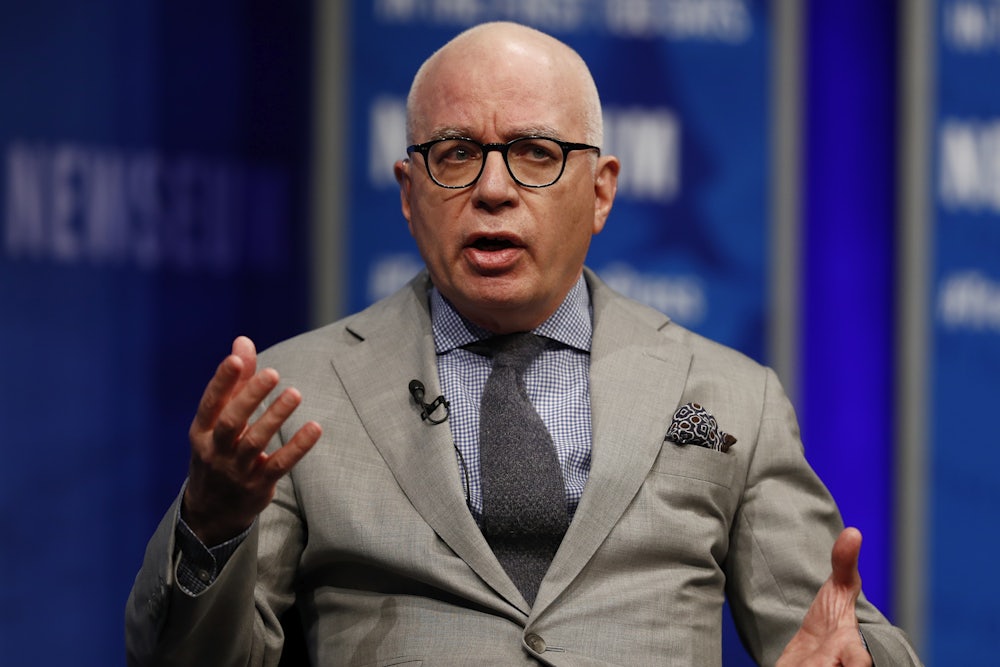With the publication of his insider account of the White House, Fire and Fury, Michael Wolff has achieved the impossible: He’s gotten Donald Trump to agree with his hated foes in the Fake News Media. Trump has twice denounced Wolff’s tome as “phony”:
I authorized Zero access to White House (actually turned him down many times) for author of phony book! I never spoke to him for book. Full of lies, misrepresentations and sources that don’t exist. Look at this guy’s past and watch what happens to him and Sloppy Steve!
— Donald J. Trump (@realDonaldTrump) January 5, 2018
Well, now that collusion with Russia is proving to be a total hoax and the only collusion is with Hillary Clinton and the FBI/Russia, the Fake News Media (Mainstream) and this phony new book are hitting out at every new front imaginable. They should try winning an election. Sad!
— Donald J. Trump (@realDonaldTrump) January 5, 2018
Many prominent journalists who cover Trump agree, casting doubts on both Wolff’s factual accuracy and his allegedly unethical approach to sourcing. Speaking on CNN, New York Times reporter Maggie Haberman said Wolff “gets basic details wrong.... He creates a narrative that is notionally true, conceptually true, the details are often wrong.” Haberman noted an inconsistency between a Wolff column and his book (did Rupert Murdoch call Trump a “fucking idiot” or a “fucking moron”?), and claims that Wolff mischaracterized a Times article. Meanwhile, a number of subjects, including former deputy White House chief of staff Katie Walsh, are contesting quotes attributed to them in the book. Trump confidant Tom Barrack is quoted as saying of the president, “He’s not only crazy, he’s stupid.” On Twitter, Haberman reports that Barrack calls this quote “totally false.”
Vanity Fair reporter Gabriel Sherman has a more far-reaching criticism, accusing Wolff of breaking basic rules of journalism ethics in order to get his scoops:
For more than a year Wolff viciously attacked journalists, fueling public distrust in the news media in service of buttering up his Trump sources to...write a book that confirms what journalists like @maggieNYT have been reporting all along.
— Gabriel Sherman (@gabrielsherman) January 5, 2018
So basically Wolff's approach was to lie in service of getting the truth.
— Gabriel Sherman (@gabrielsherman) January 5, 2018
On substance, Haberman, Sherman, and other critics are absolutely right: Wolff is a shoddy, dishonest journalist and his book has to be read with suspicion. Wolff clearly plays loose with the facts, and he earned and maintained access to the administration by defending it against the media. As CNN notes, “While working on the book, he also publicly flattered his sources and criticized other news outlets for being too tough on Trump.” Wolff himself told the Today show, “I said what was necessary to get the story.”
Nor is it clear that the sources Wolff quoted by name knew that he would treat their comments as on the record. As Michelle Cottle noted in a devastating 2004 profile in The New Republic, Wolff has a record of “burning sources by putting off-the-record comments on the record.” Cottle’s critique of Wolff’s work as a media gossip columnist in the George W. Bush era resonates with many of the objections being raised to the new book:
Much to the annoyance of Wolff’s critics, the scenes in his columns aren’t recreated so much as created—springing from Wolff’s imagination rather than from actual knowledge of events. Even Wolff acknowledges that conventional reporting isn’t his bag. Rather, he absorbs the atmosphere and gossip swirling around him at cocktail parties, on the street, and especially during those long lunches at Michael’s.
Wolff’s approach to journalism is to hang around powerful people, absorb their chit chat, indiscriminately document what he overheard, and convey it in novelistic prose. As he admits in the preface to Fire and Fury, he doesn’t always make an effort to weed out self-serving or dishonest accounts:
Many of the accounts of what has happened in the Trump White House are in conflict with one another; many, in Trumpian fashion, are baldly untrue. These conflicts, and that looseness with the truth, if not with reality itself, are an elemental thread of the book.
Sometimes I have let the players offer their versions, in turn allowing the reader to judge them. In other instances I have, through a consistency in the accounts and through sources I have come to trust, settled on a version of events I believe to be true.
This approach would be highly dubious if applied to a normal administration, where normal journalistic ethics would call for verifying quotes from multiple sources and testing them against the public record. But the Trump administration might be the ideal vehicle for Wolffian journalism. The president himself is an epic bullshit artist with little regard for the truth, and many of his staffers behave likewise. Former Trump aide Sam Numberg has confessed to making up stories in order to troll the press. Given the general unreality of the Trump administration, perhaps the truest account is one written not by a normal journalist but by a fabulist like Wolff.
Times columnist Ross Douthat has described Trump’s staff as “stewards for a syphilitic emperor.” Trump doesn’t really preside over a government; rather he holds court in a monarchical fashion, surrounded by lackeys attending to his wishes. In such a regime, normal political reporting is inadequate. What you need is a court historian who can soak up palace gossip and intrigue. That’s why Wolff might be the perfect chronicler of the Trump era, as one of his fiercest critics even acknowledges:
Essentially, Wolff is the Trump of journalism. Breaks rules and norms to win. Talk about a perfect pairing of writer and subject!
— Gabriel Sherman (@gabrielsherman) January 5, 2018
